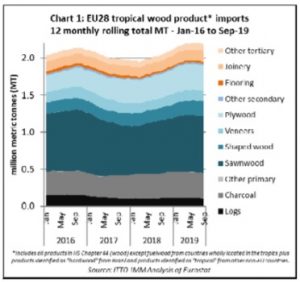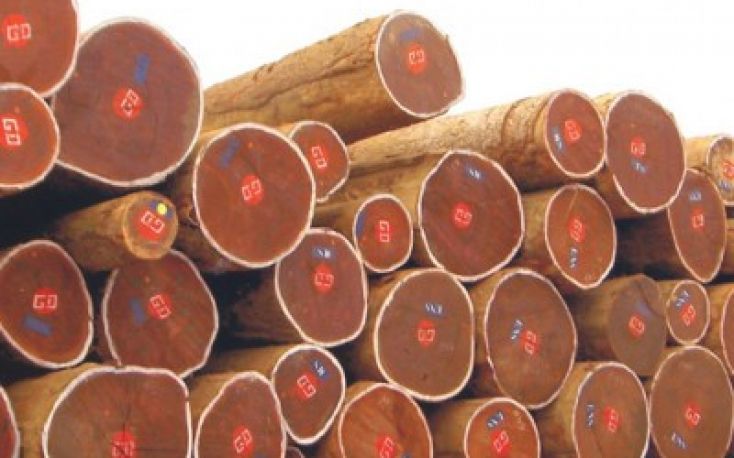The EU’s trade in tropical wood products was more buoyant in the first nine of months of 2019 than the same period in 2018. However, the rise in imports, which began in the second quarter of 2018, has levelled off since June this year.
 Chart 1 shows twelve monthly rolling total imports (to iron out seasonal fluctuations) into the EU of all tropical wood products listed in HS Chapter 44 (excluding fuelwood, wood waste and chips). It shows that the 12- month rolling total dipped to 1.95 million metric tonnes (MT) in March 2018, then increased to a peak of 2.21 million MT in June 2019 before slipping back slightly to 2.19 million MT in September 2019.
Chart 1 shows twelve monthly rolling total imports (to iron out seasonal fluctuations) into the EU of all tropical wood products listed in HS Chapter 44 (excluding fuelwood, wood waste and chips). It shows that the 12- month rolling total dipped to 1.95 million metric tonnes (MT) in March 2018, then increased to a peak of 2.21 million MT in June 2019 before slipping back slightly to 2.19 million MT in September 2019.
The slowing pace of growth in European tropical wood imports coincides with mounting signs of weakness in the wider economy. In its new Regional Economic Outlook for Europe, issued on 6th November, the IMF points out that growth has slowed this year. Although that’s mainly due to weaker global trade (thanks to the US-China tariffs), and a slowdown in manufacturing this year, there are signs that the weakness is spreading.
According to the IMF, “for most of the region, the slowdown remains externally driven. However, some signs of softer domestic demand have started to appear, especially in investment. Services and domestic consumption have been buoyant so far, but their resilience is tightly linked to labor market conditions, which, despite some easing, remain robust. Expansionary fiscal policy in many countries and looser financial conditions have also supported domestic demand”.
IMF forecasts that Europe’s growth will decline from 2.3% in 2018 to 1.4% in 2019. A modest and precarious recovery is forecast for 2020, with growth reaching 1.8%, as global trade is expected to pick up and some economies recover from past stresses.
IMF notes that this projection masks significant differences between “advanced” (i.e. mainly Western) and “emerging” (mainly Eastern) Europe and that “growth in advanced Europe has been revised down by 0.1 percentage point to 1.3 percent in 2019, while growth in emerging Europe has been revised up by 0.5 percentage point to 1.8 percent”.
In total, the EU imported 1.66 million MT of tropical wood products in the first nine months of 2019, 5.3% more than the same period in 2018. The total value of EU imports of tropical wood products in the January to September 2019 period was €1.80 billion, 9% more than the same period in 2018.
So far this year, there have been gains in EU imports of tropical sawnwood, charcoal, plywood, mouldings, and joinery products. These have been only partly offset by a decline in imports of tropical logs, veneers, and flooring.






Leave a Reply